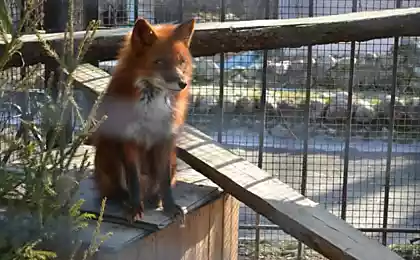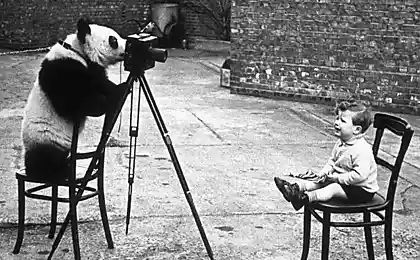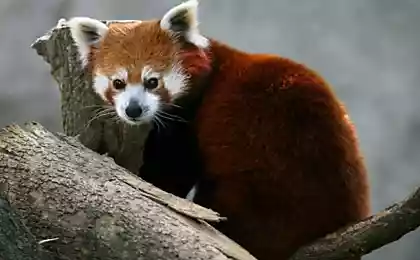427
Young red Panda from the zoo Hamilton
The zoo Hamilton Zoo) presented two new cubs rare Nepalese red pandas that were born at the beginning of this year. And only now, when the kids turned four months, they began to explore the world around them.
Photo: Hamilton Zoo
According to Samantha Kudevich, curator of the zoo, the mother and her children recently moved into an outdoor aviary, where now they can see everyone. So later the relocation was a necessary measure, since newborns grow very slowly and poorly gaining weight.
Due to the small quantity of mother's milk, people had to transfer babies to a partial artificial feeding. Only after the accepted measures the weight has finally started to grow and kids become more active.
— This often happens — explains the curator — especially in families of pandas, where more than one cub. Now the twins are quite healthy and has finally started to examine a new residence, enjoying the new territory.
The sex of the babies is not yet known, but experts suggest that it's two girls. — If so, it means that we were incredibly lucky, because in our zoo already has two boys from another pair of pandas that were born last year, says Ms. Kulevich.
— If all goes well, then we can hope that later they will have offspring, — said the expert. – By the way, the two males call Karma and NIMA. They are very active and funny guys, and have already sang to win the hearts of not only the staff but also the many visitors to the Park.
Small, or red pandas (lat. Ailurus fulgens) found in the mountainous bamboo forests of Western China, the Himalayas, Nepal, Bhutan, Myanmar and India. Eat the same vegetation (leaves of bamboo), and giant pandas, but sometimes I can eat fruit, small animals and bird eggs.
The red Panda is listed by the International Union for conservation of nature's Red list as "vulnerable". Today, due to deforestation and poaching in the wild there are less than 10 thousand small pandas. Several hundred of these animals are contained in 85 zoos around the world.
Source: zoopicture.ru
Photo: Hamilton Zoo
According to Samantha Kudevich, curator of the zoo, the mother and her children recently moved into an outdoor aviary, where now they can see everyone. So later the relocation was a necessary measure, since newborns grow very slowly and poorly gaining weight.
Due to the small quantity of mother's milk, people had to transfer babies to a partial artificial feeding. Only after the accepted measures the weight has finally started to grow and kids become more active.
— This often happens — explains the curator — especially in families of pandas, where more than one cub. Now the twins are quite healthy and has finally started to examine a new residence, enjoying the new territory.
The sex of the babies is not yet known, but experts suggest that it's two girls. — If so, it means that we were incredibly lucky, because in our zoo already has two boys from another pair of pandas that were born last year, says Ms. Kulevich.
— If all goes well, then we can hope that later they will have offspring, — said the expert. – By the way, the two males call Karma and NIMA. They are very active and funny guys, and have already sang to win the hearts of not only the staff but also the many visitors to the Park.
Small, or red pandas (lat. Ailurus fulgens) found in the mountainous bamboo forests of Western China, the Himalayas, Nepal, Bhutan, Myanmar and India. Eat the same vegetation (leaves of bamboo), and giant pandas, but sometimes I can eat fruit, small animals and bird eggs.
The red Panda is listed by the International Union for conservation of nature's Red list as "vulnerable". Today, due to deforestation and poaching in the wild there are less than 10 thousand small pandas. Several hundred of these animals are contained in 85 zoos around the world.
Source: zoopicture.ru






















